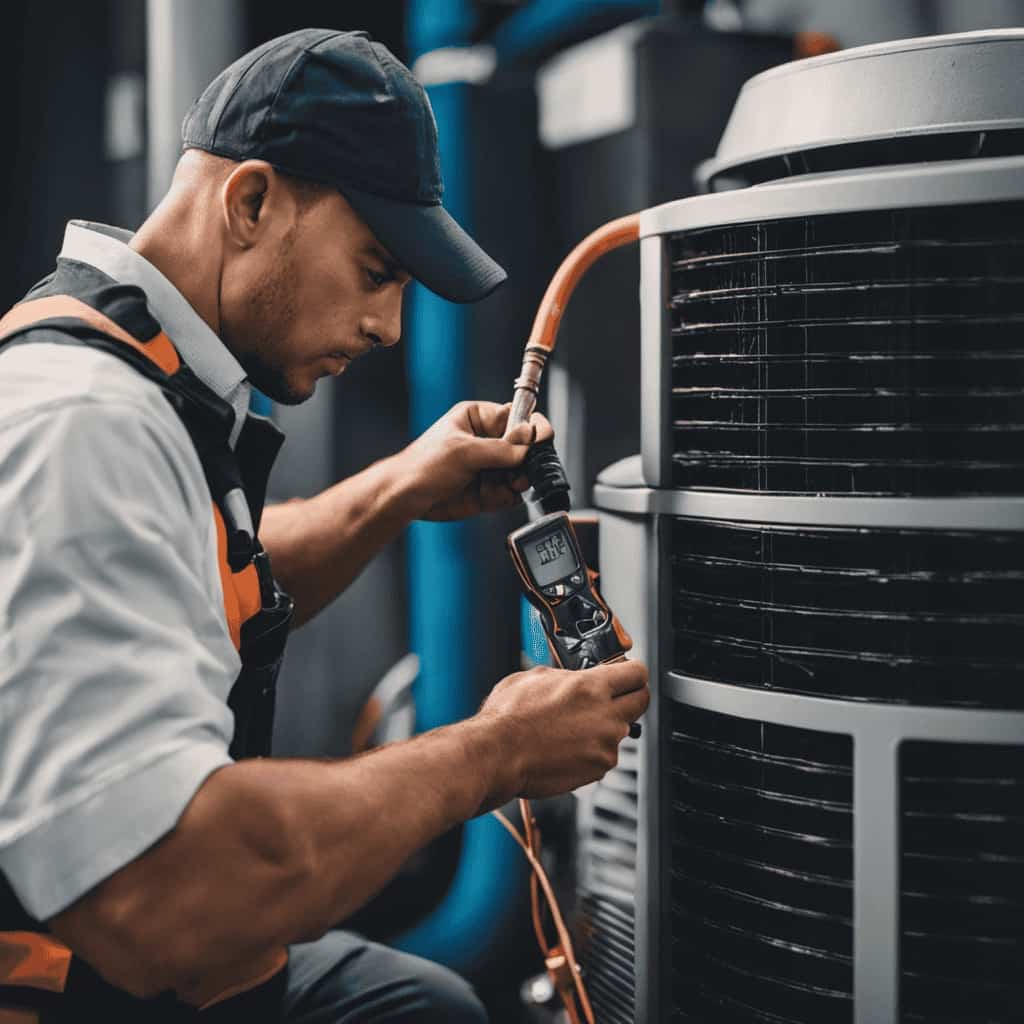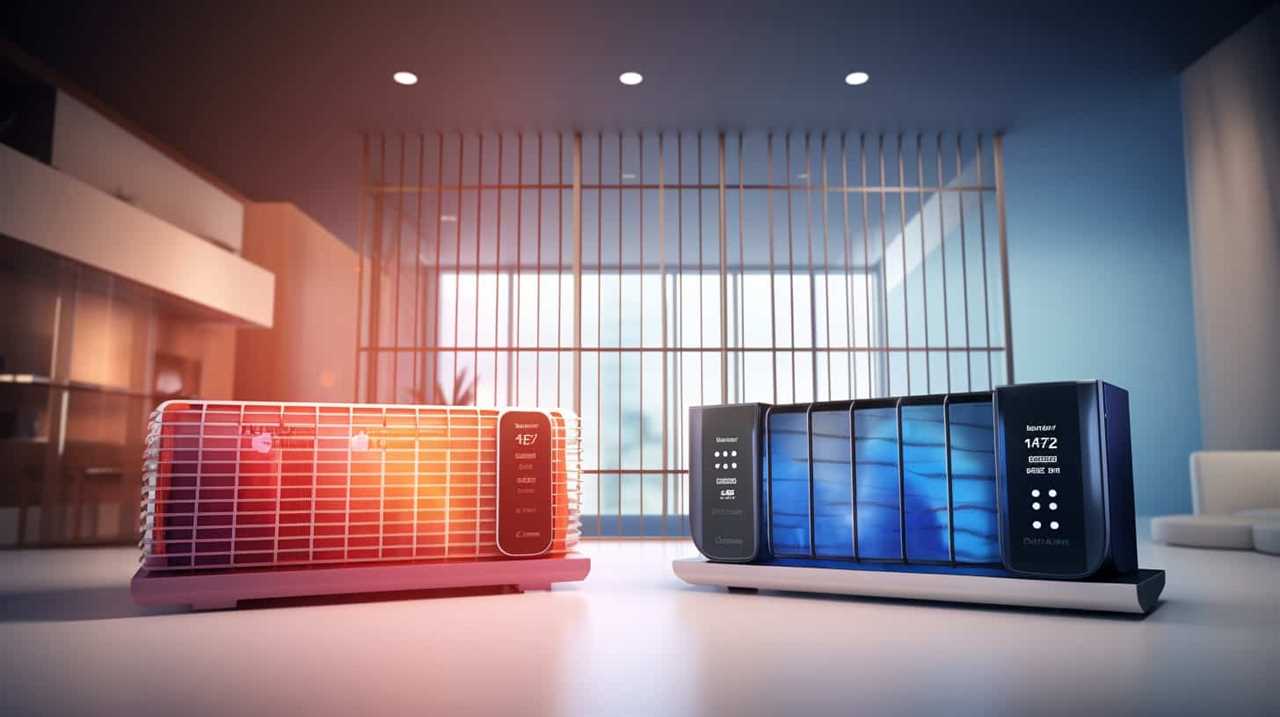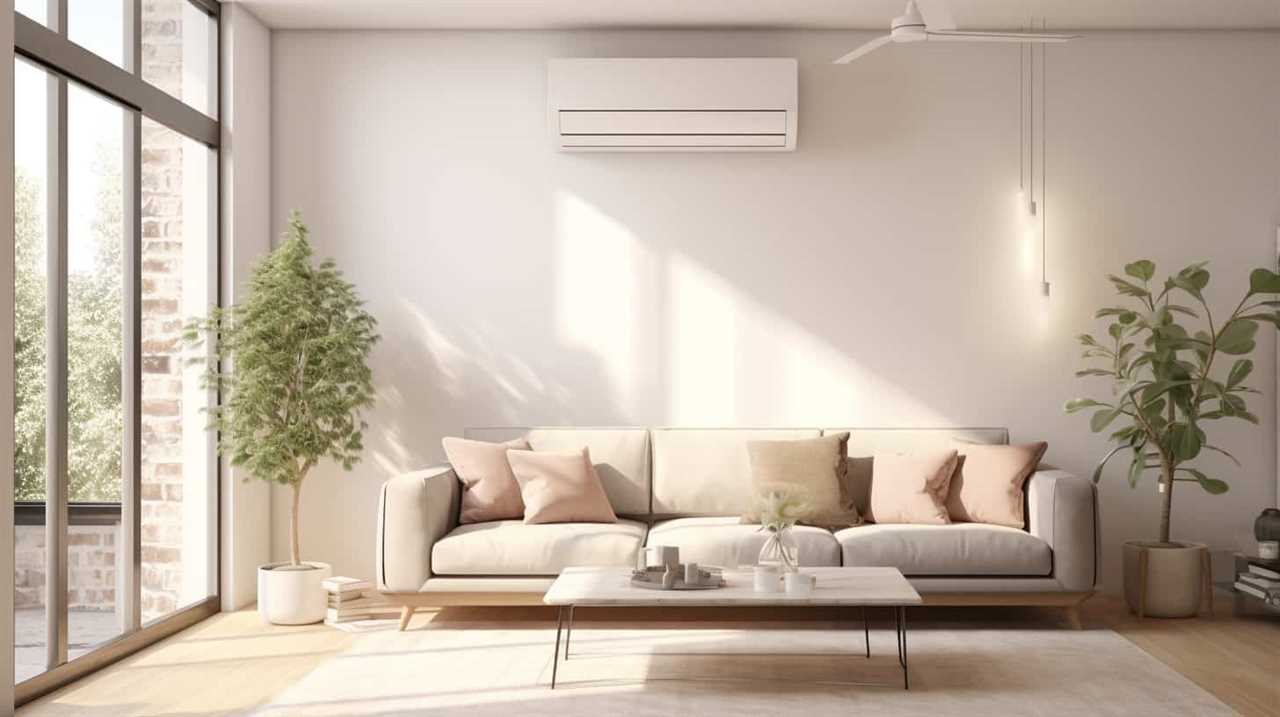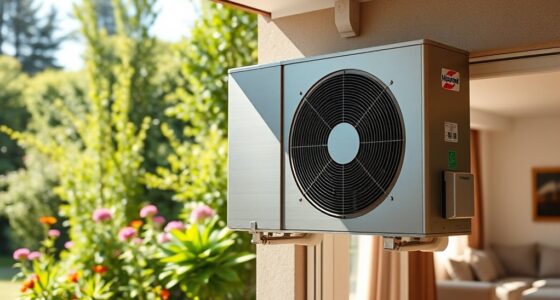Tired of paying high energy bills because of your heat pump air conditioning? No need to fret, as we have a solution for you!
In this article, we’ll show you how to cut costs and save money while keeping your home cool and comfortable.
From understanding efficiency ratings to optimizing settings and exploring alternative cooling methods, we’ll provide you with innovative solutions to lower your expenses.
Say goodbye to sky-high bills and hello to a more efficient and cost-effective cooling system!

Key Takeaways
- Understand heat pump AC efficiency ratings (EER and SEER) to choose a cost-effective system
- Optimize heat pump AC settings by adjusting the thermostat based on occupancy and comfort needs
- Insulate and seal your home to maximize efficiency and prevent air leakage
- Regularly maintain and clean your heat pump AC system to ensure optimal performance and energy efficiency
Understanding Heat Pump AC Efficiency Ratings
We should start by understanding the efficiency ratings of heat pump AC systems. Efficiency ratings play a crucial role in determining the performance and cost-effectiveness of these systems.
When it comes to improving ventilation and troubleshooting common heat pump issues, it’s essential to consider the energy efficiency ratio (EER) and the seasonal energy efficiency ratio (SEER). The EER measures the cooling capacity of the heat pump AC system divided by the electrical power input. A higher EER indicates better energy efficiency.
On the other hand, the SEER takes into account the entire cooling season, making it a more comprehensive measure of efficiency.
Optimizing Your Heat Pump AC Settings
To optimize our heat pump AC settings and minimize costs, it’s important to adjust the thermostat based on our occupancy and comfort needs. By implementing energy saving tips and temperature control strategies, we can achieve maximum efficiency.

One effective tip is to set the thermostat to a slightly higher temperature when we’re away from home or during sleeping hours. This reduces the workload on the heat pump AC and saves energy.
Additionally, using programmable thermostats allows us to schedule temperature adjustments according to our daily routines. By taking advantage of the heat pump AC’s ability to efficiently maintain a constant temperature, we can further optimize energy consumption.
These strategies not only reduce costs but also contribute to a more sustainable and eco-friendly lifestyle.
Now let’s explore how insulating and sealing our home can enhance the efficiency of our heat pump AC.

Insulating and Sealing Your Home for Maximum Efficiency
By insulating and sealing our home, we can maximize the efficiency of our heat pump AC. Here are some energy-saving techniques and weatherproofing strategies to consider:
-
Install insulation: Good insulation helps to keep the cool air inside during summer and prevents heat loss in winter. Consider insulating walls, ceilings, and floors.
-
Seal air leaks: Identify and seal any gaps or cracks around windows, doors, and other openings using weatherstripping or caulk. This prevents conditioned air from escaping and outdoor air from entering.
-
Upgrade windows: Consider installing energy-efficient windows that have double or triple glazing and low-emissivity coatings to minimize heat transfer.

-
Insulate ductwork: Insulating the ducts that distribute air throughout your home prevents energy loss and improves overall efficiency.
By implementing these energy-saving techniques and weatherproofing strategies, we can ensure that our heat pump AC operates at maximum efficiency.
Now, let’s move on to the next section where we’ll discuss regular maintenance and cleaning tips for your heat pump AC.
Regular Maintenance and Cleaning Tips for Your Heat Pump AC
Regularly maintaining and cleaning our heat pump AC is essential for optimal performance and efficiency. To ensure energy savings and troubleshoot common issues, follow these tips.

-
Start by checking and cleaning the air filters every month. Dirty filters restrict airflow, reducing efficiency. Clean or replace them as needed.
-
Inspect the outdoor unit for debris and clear any obstructions. Clean the coils regularly to remove dirt and grime buildup. Use a soft brush or vacuum to gently clean the fins.
-
Check the condensate drain to ensure it’s clear of blockages.
-
Lubricate the motor and fan bearings annually for smooth operation.

-
Lastly, schedule professional maintenance at least once a year to detect and address any potential issues.
Exploring Alternative Cooling Methods to Supplement Your Heat Pump AC
For additional cooling options, we can consider using alternative methods in conjunction with our heat pump AC. These methods can help us achieve better efficiency and further reduce costs. Here are four alternative cooling methods to explore:
-
Geothermal cooling: Utilizing the earth’s constant temperature, geothermal cooling systems transfer heat from the house to the ground during the cooling process. This method is highly efficient and can provide substantial energy savings.
-
Evaporative cooling: By using the natural process of evaporation, evaporative cooling systems cool the air by passing it over water-saturated pads, which lowers the temperature. This method is particularly effective in dry climates and can be more energy-efficient than traditional air conditioning.

-
Ventilation: Enhancing natural ventilation in your home can help improve airflow and reduce the need for air conditioning. This can be achieved through strategic placement of windows, vents, and fans to promote cross-ventilation and fresh air circulation.
-
Shading and insulation: Implementing proper shading techniques, such as using blinds, curtains, or external shading devices, can prevent excessive heat gain from the sun. Additionally, ensuring proper insulation in walls, floors, and ceilings can significantly reduce heat transfer, keeping the indoor space cooler.
Exploring these alternative cooling methods can help us optimize our cooling needs while minimizing energy consumption and costs.
Frequently Asked Questions
How Does a Heat Pump AC System Work?
A heat pump AC system works by utilizing heat pump technology to transfer heat from the outside air to the inside of a building, providing both cooling and heating. This innovative system maximizes energy efficiency, reducing costs.

What Are the Benefits of Using a Heat Pump AC System?
Using a heat pump AC system offers numerous benefits, such as energy efficiency and cost savings. By harnessing renewable energy sources, we can reduce our carbon footprint while enjoying comfortable indoor temperatures.
Are Heat Pump AC Systems Suitable for All Climates?
Heat pump AC systems are suitable for all climates due to their high efficiency. When comparing costs, heat pump ACs are more efficient than traditional ACs, resulting in lower energy bills.
Can a Heat Pump AC System Be Used for Heating as Well?
Yes, a heat pump AC system can be used for heating as well. The installation of a heat pump AC system allows for efficient heating and cooling, resulting in significant cost savings.
How Long Do Heat Pump AC Systems Typically Last?
Heat pump AC systems typically last an average of 15 to 20 years with proper maintenance. To extend their lifespan, regular filter cleaning, annual professional inspections, and maintaining adequate refrigerant levels are crucial.

Conclusion
In conclusion, by understanding heat pump AC efficiency ratings, optimizing settings, insulating and sealing our homes, and performing regular maintenance, we can effectively cut costs while running a heat pump AC.
However, it’s important to remember that no cooling method is perfect, and exploring alternative options can supplement the efficiency of our heat pump AC.
As the saying goes, ‘Don’t put all your eggs in one basket,’ and finding the right balance of cooling methods can maximize our savings and comfort.









